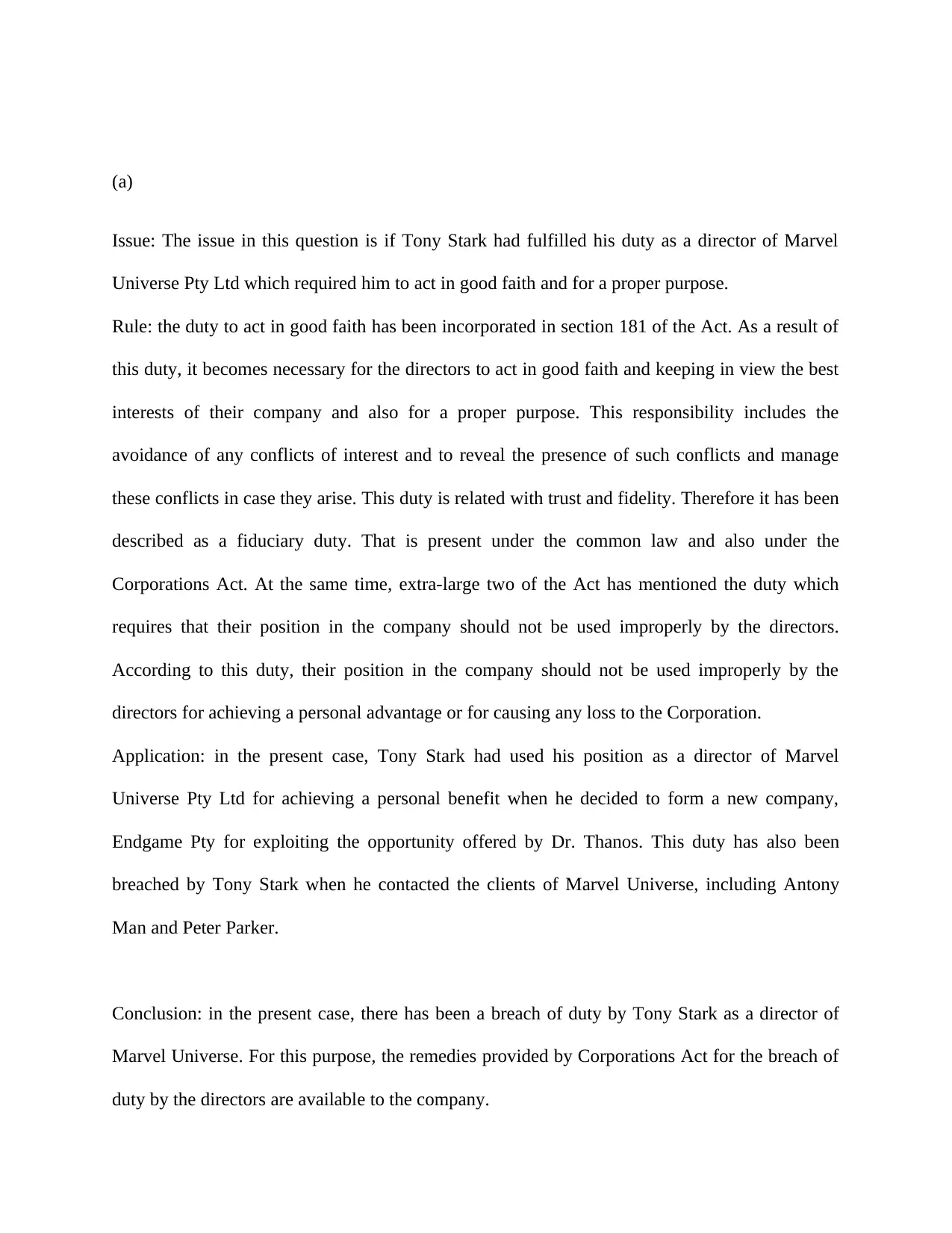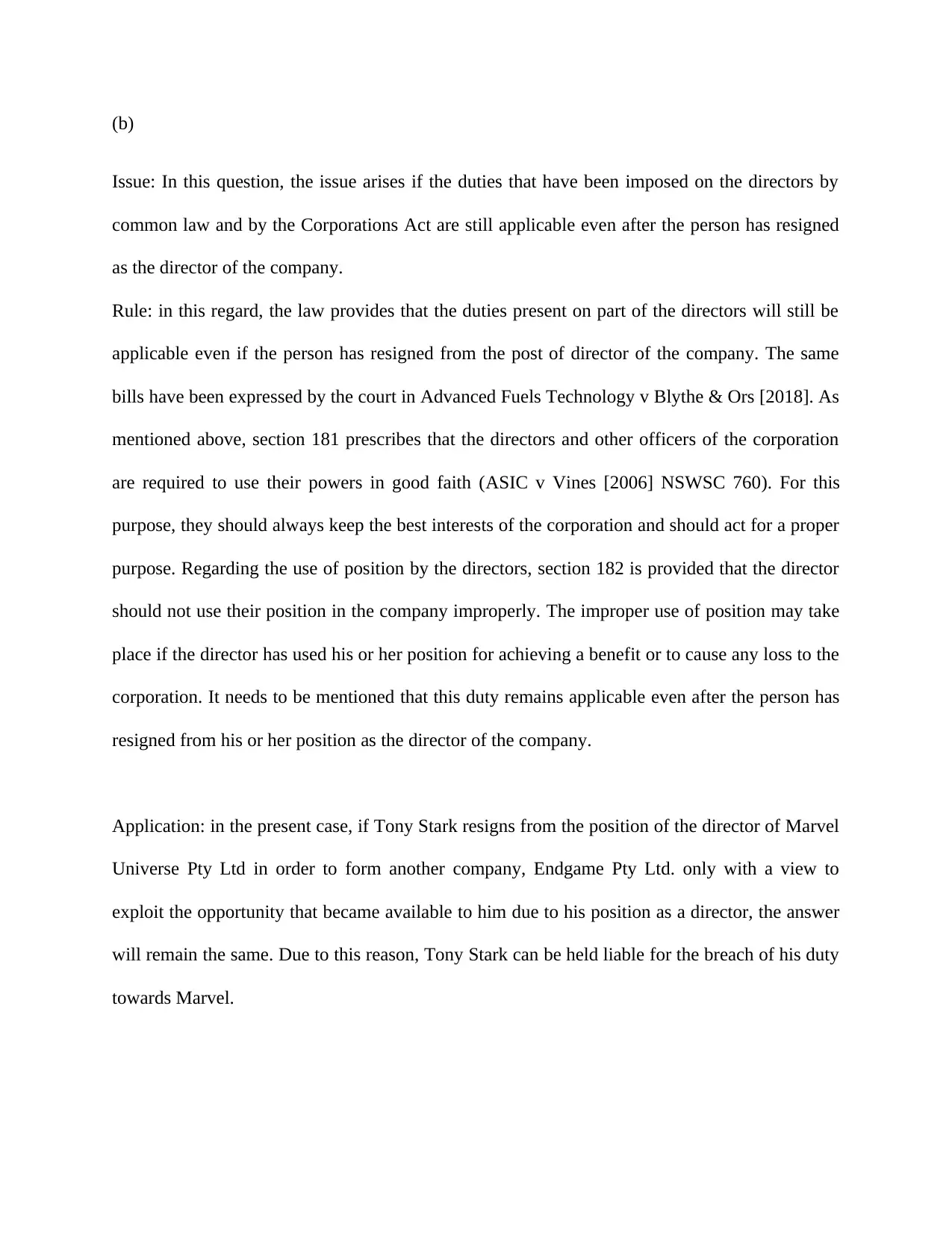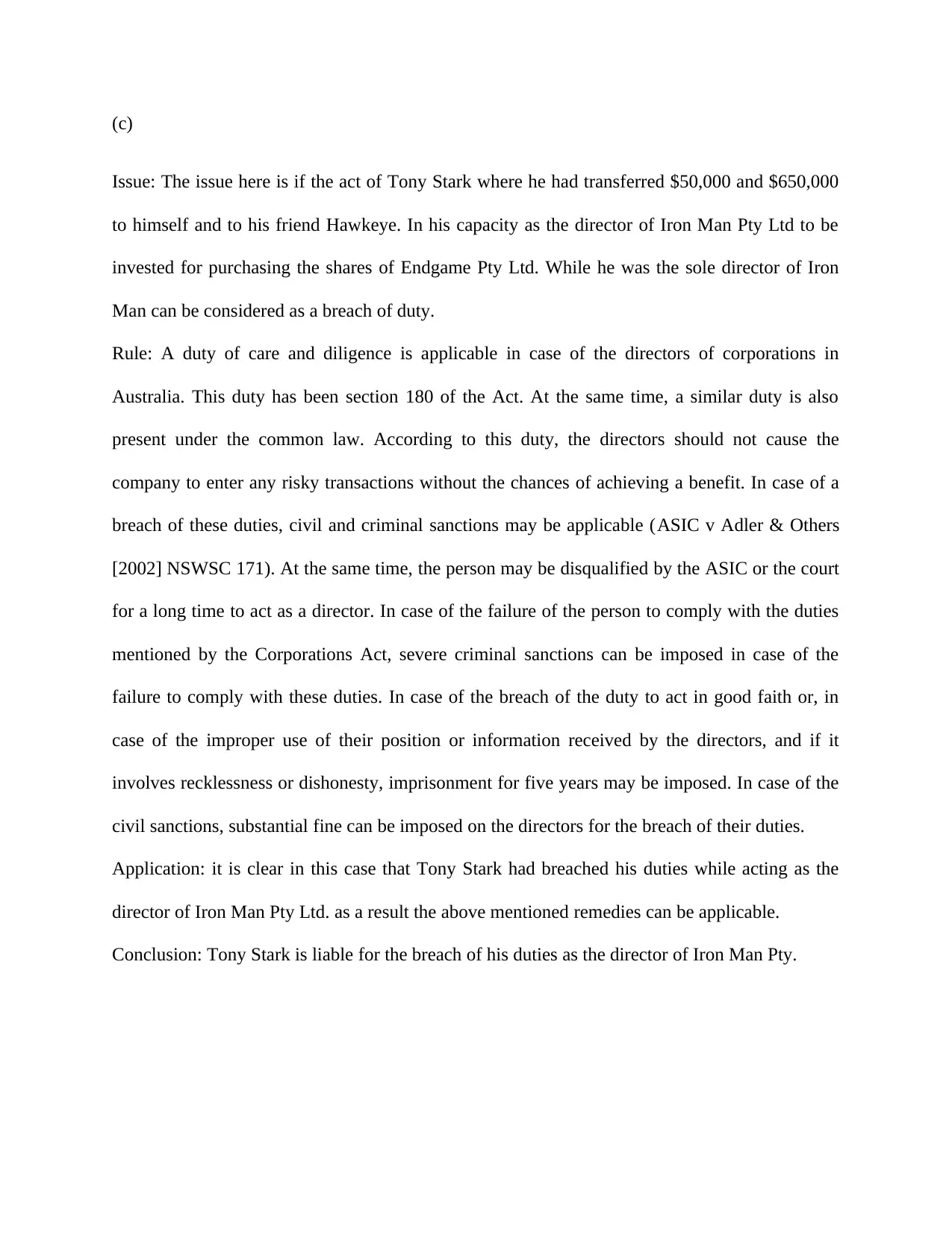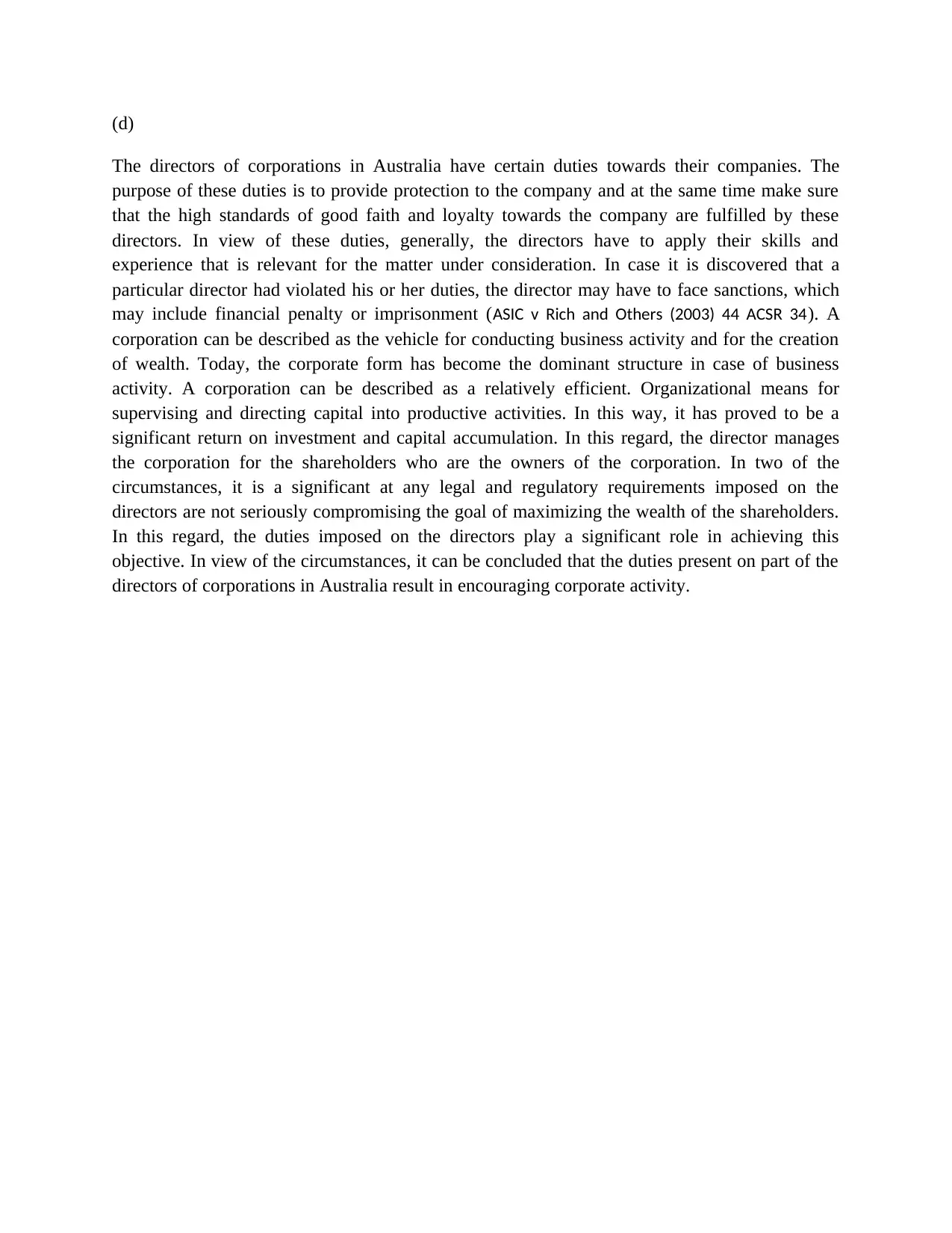Directors' Duties and Liabilities: A Marvel Universe Analysis
VerifiedAdded on 2022/10/17
|4
|1322
|255
Case Study
AI Summary
This case study analyzes the duties of directors in the context of Marvel Universe Pty Ltd, focusing on the actions of Tony Stark. The analysis examines breaches of directors' duties, including the duty to act in good faith, avoid conflicts of interest, and not misuse their position for personal gain. The assignment explores the applicability of these duties even after resignation and the implications of financial transactions made by Stark. It references relevant sections of the Corporations Act and common law principles, providing a comprehensive overview of director responsibilities and potential liabilities, including civil and criminal sanctions. The conclusion emphasizes the importance of directors upholding their duties to protect the company and maximize shareholder wealth.

(a)
Issue: The issue in this question is if Tony Stark had fulfilled his duty as a director of Marvel
Universe Pty Ltd which required him to act in good faith and for a proper purpose.
Rule: the duty to act in good faith has been incorporated in section 181 of the Act. As a result of
this duty, it becomes necessary for the directors to act in good faith and keeping in view the best
interests of their company and also for a proper purpose. This responsibility includes the
avoidance of any conflicts of interest and to reveal the presence of such conflicts and manage
these conflicts in case they arise. This duty is related with trust and fidelity. Therefore it has been
described as a fiduciary duty. That is present under the common law and also under the
Corporations Act. At the same time, extra-large two of the Act has mentioned the duty which
requires that their position in the company should not be used improperly by the directors.
According to this duty, their position in the company should not be used improperly by the
directors for achieving a personal advantage or for causing any loss to the Corporation.
Application: in the present case, Tony Stark had used his position as a director of Marvel
Universe Pty Ltd for achieving a personal benefit when he decided to form a new company,
Endgame Pty for exploiting the opportunity offered by Dr. Thanos. This duty has also been
breached by Tony Stark when he contacted the clients of Marvel Universe, including Antony
Man and Peter Parker.
Conclusion: in the present case, there has been a breach of duty by Tony Stark as a director of
Marvel Universe. For this purpose, the remedies provided by Corporations Act for the breach of
duty by the directors are available to the company.
Issue: The issue in this question is if Tony Stark had fulfilled his duty as a director of Marvel
Universe Pty Ltd which required him to act in good faith and for a proper purpose.
Rule: the duty to act in good faith has been incorporated in section 181 of the Act. As a result of
this duty, it becomes necessary for the directors to act in good faith and keeping in view the best
interests of their company and also for a proper purpose. This responsibility includes the
avoidance of any conflicts of interest and to reveal the presence of such conflicts and manage
these conflicts in case they arise. This duty is related with trust and fidelity. Therefore it has been
described as a fiduciary duty. That is present under the common law and also under the
Corporations Act. At the same time, extra-large two of the Act has mentioned the duty which
requires that their position in the company should not be used improperly by the directors.
According to this duty, their position in the company should not be used improperly by the
directors for achieving a personal advantage or for causing any loss to the Corporation.
Application: in the present case, Tony Stark had used his position as a director of Marvel
Universe Pty Ltd for achieving a personal benefit when he decided to form a new company,
Endgame Pty for exploiting the opportunity offered by Dr. Thanos. This duty has also been
breached by Tony Stark when he contacted the clients of Marvel Universe, including Antony
Man and Peter Parker.
Conclusion: in the present case, there has been a breach of duty by Tony Stark as a director of
Marvel Universe. For this purpose, the remedies provided by Corporations Act for the breach of
duty by the directors are available to the company.
Paraphrase This Document
Need a fresh take? Get an instant paraphrase of this document with our AI Paraphraser

(b)
Issue: In this question, the issue arises if the duties that have been imposed on the directors by
common law and by the Corporations Act are still applicable even after the person has resigned
as the director of the company.
Rule: in this regard, the law provides that the duties present on part of the directors will still be
applicable even if the person has resigned from the post of director of the company. The same
bills have been expressed by the court in Advanced Fuels Technology v Blythe & Ors [2018]. As
mentioned above, section 181 prescribes that the directors and other officers of the corporation
are required to use their powers in good faith (ASIC v Vines [2006] NSWSC 760). For this
purpose, they should always keep the best interests of the corporation and should act for a proper
purpose. Regarding the use of position by the directors, section 182 is provided that the director
should not use their position in the company improperly. The improper use of position may take
place if the director has used his or her position for achieving a benefit or to cause any loss to the
corporation. It needs to be mentioned that this duty remains applicable even after the person has
resigned from his or her position as the director of the company.
Application: in the present case, if Tony Stark resigns from the position of the director of Marvel
Universe Pty Ltd in order to form another company, Endgame Pty Ltd. only with a view to
exploit the opportunity that became available to him due to his position as a director, the answer
will remain the same. Due to this reason, Tony Stark can be held liable for the breach of his duty
towards Marvel.
Issue: In this question, the issue arises if the duties that have been imposed on the directors by
common law and by the Corporations Act are still applicable even after the person has resigned
as the director of the company.
Rule: in this regard, the law provides that the duties present on part of the directors will still be
applicable even if the person has resigned from the post of director of the company. The same
bills have been expressed by the court in Advanced Fuels Technology v Blythe & Ors [2018]. As
mentioned above, section 181 prescribes that the directors and other officers of the corporation
are required to use their powers in good faith (ASIC v Vines [2006] NSWSC 760). For this
purpose, they should always keep the best interests of the corporation and should act for a proper
purpose. Regarding the use of position by the directors, section 182 is provided that the director
should not use their position in the company improperly. The improper use of position may take
place if the director has used his or her position for achieving a benefit or to cause any loss to the
corporation. It needs to be mentioned that this duty remains applicable even after the person has
resigned from his or her position as the director of the company.
Application: in the present case, if Tony Stark resigns from the position of the director of Marvel
Universe Pty Ltd in order to form another company, Endgame Pty Ltd. only with a view to
exploit the opportunity that became available to him due to his position as a director, the answer
will remain the same. Due to this reason, Tony Stark can be held liable for the breach of his duty
towards Marvel.

(c)
Issue: The issue here is if the act of Tony Stark where he had transferred $50,000 and $650,000
to himself and to his friend Hawkeye. In his capacity as the director of Iron Man Pty Ltd to be
invested for purchasing the shares of Endgame Pty Ltd. While he was the sole director of Iron
Man can be considered as a breach of duty.
Rule: A duty of care and diligence is applicable in case of the directors of corporations in
Australia. This duty has been section 180 of the Act. At the same time, a similar duty is also
present under the common law. According to this duty, the directors should not cause the
company to enter any risky transactions without the chances of achieving a benefit. In case of a
breach of these duties, civil and criminal sanctions may be applicable (ASIC v Adler & Others
[2002] NSWSC 171). At the same time, the person may be disqualified by the ASIC or the court
for a long time to act as a director. In case of the failure of the person to comply with the duties
mentioned by the Corporations Act, severe criminal sanctions can be imposed in case of the
failure to comply with these duties. In case of the breach of the duty to act in good faith or, in
case of the improper use of their position or information received by the directors, and if it
involves recklessness or dishonesty, imprisonment for five years may be imposed. In case of the
civil sanctions, substantial fine can be imposed on the directors for the breach of their duties.
Application: it is clear in this case that Tony Stark had breached his duties while acting as the
director of Iron Man Pty Ltd. as a result the above mentioned remedies can be applicable.
Conclusion: Tony Stark is liable for the breach of his duties as the director of Iron Man Pty.
Issue: The issue here is if the act of Tony Stark where he had transferred $50,000 and $650,000
to himself and to his friend Hawkeye. In his capacity as the director of Iron Man Pty Ltd to be
invested for purchasing the shares of Endgame Pty Ltd. While he was the sole director of Iron
Man can be considered as a breach of duty.
Rule: A duty of care and diligence is applicable in case of the directors of corporations in
Australia. This duty has been section 180 of the Act. At the same time, a similar duty is also
present under the common law. According to this duty, the directors should not cause the
company to enter any risky transactions without the chances of achieving a benefit. In case of a
breach of these duties, civil and criminal sanctions may be applicable (ASIC v Adler & Others
[2002] NSWSC 171). At the same time, the person may be disqualified by the ASIC or the court
for a long time to act as a director. In case of the failure of the person to comply with the duties
mentioned by the Corporations Act, severe criminal sanctions can be imposed in case of the
failure to comply with these duties. In case of the breach of the duty to act in good faith or, in
case of the improper use of their position or information received by the directors, and if it
involves recklessness or dishonesty, imprisonment for five years may be imposed. In case of the
civil sanctions, substantial fine can be imposed on the directors for the breach of their duties.
Application: it is clear in this case that Tony Stark had breached his duties while acting as the
director of Iron Man Pty Ltd. as a result the above mentioned remedies can be applicable.
Conclusion: Tony Stark is liable for the breach of his duties as the director of Iron Man Pty.
⊘ This is a preview!⊘
Do you want full access?
Subscribe today to unlock all pages.

Trusted by 1+ million students worldwide

(d)
The directors of corporations in Australia have certain duties towards their companies. The
purpose of these duties is to provide protection to the company and at the same time make sure
that the high standards of good faith and loyalty towards the company are fulfilled by these
directors. In view of these duties, generally, the directors have to apply their skills and
experience that is relevant for the matter under consideration. In case it is discovered that a
particular director had violated his or her duties, the director may have to face sanctions, which
may include financial penalty or imprisonment (ASIC v Rich and Others (2003) 44 ACSR 34). A
corporation can be described as the vehicle for conducting business activity and for the creation
of wealth. Today, the corporate form has become the dominant structure in case of business
activity. A corporation can be described as a relatively efficient. Organizational means for
supervising and directing capital into productive activities. In this way, it has proved to be a
significant return on investment and capital accumulation. In this regard, the director manages
the corporation for the shareholders who are the owners of the corporation. In two of the
circumstances, it is a significant at any legal and regulatory requirements imposed on the
directors are not seriously compromising the goal of maximizing the wealth of the shareholders.
In this regard, the duties imposed on the directors play a significant role in achieving this
objective. In view of the circumstances, it can be concluded that the duties present on part of the
directors of corporations in Australia result in encouraging corporate activity.
The directors of corporations in Australia have certain duties towards their companies. The
purpose of these duties is to provide protection to the company and at the same time make sure
that the high standards of good faith and loyalty towards the company are fulfilled by these
directors. In view of these duties, generally, the directors have to apply their skills and
experience that is relevant for the matter under consideration. In case it is discovered that a
particular director had violated his or her duties, the director may have to face sanctions, which
may include financial penalty or imprisonment (ASIC v Rich and Others (2003) 44 ACSR 34). A
corporation can be described as the vehicle for conducting business activity and for the creation
of wealth. Today, the corporate form has become the dominant structure in case of business
activity. A corporation can be described as a relatively efficient. Organizational means for
supervising and directing capital into productive activities. In this way, it has proved to be a
significant return on investment and capital accumulation. In this regard, the director manages
the corporation for the shareholders who are the owners of the corporation. In two of the
circumstances, it is a significant at any legal and regulatory requirements imposed on the
directors are not seriously compromising the goal of maximizing the wealth of the shareholders.
In this regard, the duties imposed on the directors play a significant role in achieving this
objective. In view of the circumstances, it can be concluded that the duties present on part of the
directors of corporations in Australia result in encouraging corporate activity.
1 out of 4
Related Documents
Your All-in-One AI-Powered Toolkit for Academic Success.
+13062052269
info@desklib.com
Available 24*7 on WhatsApp / Email
![[object Object]](/_next/static/media/star-bottom.7253800d.svg)
Unlock your academic potential
Copyright © 2020–2026 A2Z Services. All Rights Reserved. Developed and managed by ZUCOL.





